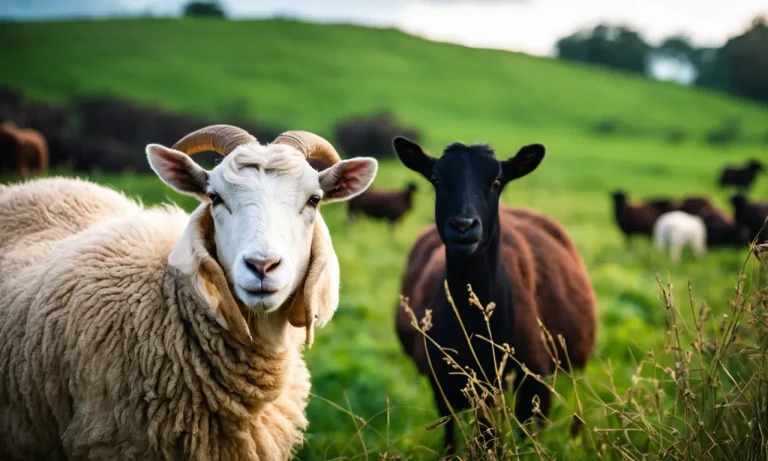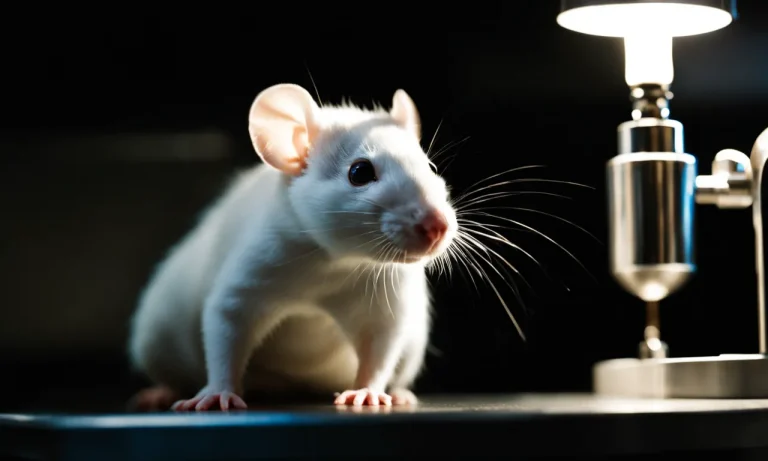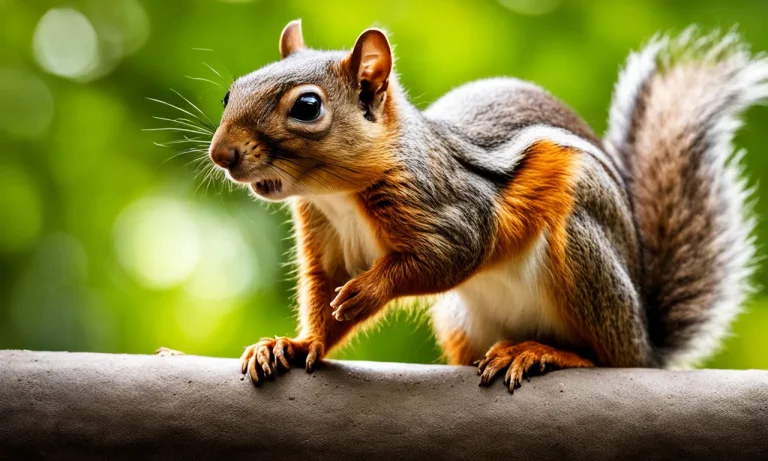Cats and rats have shared an intertwined history for thousands of years. Felines are notorious for being excellent mousers and ratters, meaning they are adept at hunting and killing rodents. So when rodents infiltrate your home, you may wonder: will getting a cat solve my rat problem?
Here’s a quick answer: yes, cats can and do kill rats, but relying solely on your cat to eliminate a rat infestation is ill-advised.
In this comprehensive article, we’ll explore the predator-prey relationship between cats and rats. We’ll cover cats’ natural hunting skills and behaviors, look at real-world examples of cats dispatching rats, and provide tips for leveraging your cat to help control rats while avoiding potential risks.
The Origins of Cats as Mousers and Natural Rodent Hunters
For centuries, cats have been known for their exceptional ability to hunt rodents, particularly rats. This innate hunting instinct can be traced back to the origins of cats as mousers and natural rodent hunters.
Cats Domesticated Themselves by Hunting Rodents in Granaries and Human Settlements
Cats’ association with humans can be dated back to ancient times when humans first started settling in agricultural communities. As people began storing grains in granaries, they unintentionally created an ideal environment for rodents to thrive.
Cats, being opportunistic hunters, recognized the abundance of prey and began frequenting these human settlements in search of food.
Over time, cats established a mutually beneficial relationship with humans. They kept rodents at bay, preventing damage to the precious food supplies, and in return, they received a steady source of sustenance.
This symbiotic bond led to the domestication of cats as they gradually became more reliant on humans for survival.
Historical evidence supports this theory, with archaeological findings showing the presence of cats in ancient Egyptian granaries. These findings further cement the idea that cats played a vital role in controlling rodent populations, ensuring the preservation of scarce food resources.
Selective Breeding Further Refined Cats’ Rat-Hunting Instincts and Abilities
While cats initially domesticated themselves through their inherent hunting skills, human intervention through selective breeding further honed their rat-hunting instincts and abilities. As humans recognized the value of cats as natural pest controllers, they began selectively breeding cats with desirable hunting traits.
Through generations of careful breeding, certain cat breeds have become renowned for their exceptional rat-catching abilities. For example, the British Shorthair and Scottish Fold breeds are known for their prowess in hunting rodents.
These cats possess a combination of attributes, such as agility, speed, keen senses, and a strong prey drive, making them highly effective in catching rats.
It’s important to note that while selective breeding has enhanced cats’ hunting abilities, not all cats possess the same level of skill or inclination to hunt rodents. Some cats may have a stronger prey drive than others, while some may not exhibit any interest in hunting at all.
Each cat’s individual personality and upbringing can also influence their hunting behavior.
Cats’ Hunting Skills and Behaviors Toward Rats
Cats are renowned for their hunting skills, and one of their natural prey is rats. They possess certain behaviors and techniques that make them highly effective in catching and dispatching rats.
Stalking and Pouncing – A Cat’s Go-To Rat Hunting Techniques
When it comes to hunting rats, cats rely on their innate stalking and pouncing abilities. They have a keen sense of hearing and sight, allowing them to detect even the slightest movements of their prey. With their stealthy approach, cats patiently stalk their target, inching closer with each step.
Once they are within striking range, they pounce with lightning speed, using their strong hind legs to propel themselves forward. This technique ensures a higher success rate in catching rats.
The Killer Bite – How Cats Dispatch Rats
After catching a rat, cats have a specific method of dispatching their prey. They use their sharp teeth to deliver a swift and lethal bite to the rat’s neck or head. This bite is often quick and precise, targeting vital areas to ensure a swift kill.
Cats’ teeth are designed to puncture and penetrate, making it difficult for rats to escape once caught.
Toying With Prey – Why Cats Sometimes Don’t Kill Rats Right Away
While cats are excellent rat hunters, there are instances when they don’t kill their prey right away. This behavior is often seen as “toying” with the rat, as cats may let the rat go momentarily before catching it again.
This behavior stems from a cat’s instinct to play and practice their hunting skills. It also serves as a way for cats to assert their dominance and control over the rat, ensuring they have complete control over the situation.
Cats’ Superior Senses Give Them an Edge Over Rats
Cats have superior senses that give them a significant advantage over rats. Their acute hearing allows them to detect the faintest sounds of rats scurrying or squeaking. Their sharp eyesight enables them to spot even the smallest movements, making it difficult for rats to hide.
Additionally, cats have a highly developed sense of smell, which helps them locate and track rats. These heightened senses, combined with their agility and hunting instincts, make cats formidable opponents for rats.
Real-World Examples of Cats Killing Rats
Barn Cats Safeguarding Grain Supplies and Food Storage
Barn cats have long been relied upon to protect valuable grain supplies and food storage areas from rat infestations. Farmers and warehouse owners have witnessed the impressive hunting skills of these feline predators.
With their keen senses and agility, barn cats are able to detect and track down rats, effectively reducing their population and preventing damage to stored crops and food.
One example of this can be seen on farms in rural areas, where barn cats roam freely and serve as a natural pest control solution. These cats not only keep rat populations in check but also deter other rodents from invading grain stores.
As a result, farmers can reduce their reliance on chemical pesticides, making barn cats an environmentally friendly alternative.
Feral Cat Colonies Keeping Rat Populations in Check
In urban areas, feral cat colonies have been known to play a crucial role in controlling rat populations. These colonies, often formed by abandoned or stray cats, establish territories in abandoned buildings, alleys, and other areas where rats thrive.
Research has shown that feral cats can significantly reduce rat populations in their chosen territories.
For example, in a study conducted in a city with a high rat infestation, the presence of feral cat colonies led to a 50% decrease in rat sightings. The cats’ hunting instincts and ability to adapt to urban environments make them effective rat hunters.
This natural form of pest control not only benefits humans by reducing rat-related problems but also improves the overall ecosystem balance in urban areas.
House Cats Protecting Homes by Killing Rats
Even our beloved house cats have been known to step up as rat hunters, protecting our homes from these unwanted pests. Many homeowners have witnessed their cats’ hunting prowess as they chase and capture rats that may have found their way inside.
One heartwarming example comes from a family living in an old house plagued by rats. Their cat, named Whiskers, took it upon herself to rid the house of these pesky intruders. Whiskers became a hero in the eyes of her owners, who were amazed at her natural hunting abilities.
Not only did she eliminate the rat problem, but she also brought a sense of security and peace of mind to the household.
While it’s important to note that not all cats are natural-born rat hunters, these real-world examples demonstrate the potential of cats as effective rodent control agents. Whether it’s barn cats protecting grain supplies, feral cat colonies reducing rat populations in urban areas, or house cats safeguarding our homes, cats have proven themselves to be valuable allies in the ongoing battle against rats.
Leveraging Your Cat to Help Control Rats
If you have a rat problem, one effective and natural solution may be to enlist the help of your furry feline friend. Cats have a natural instinct to hunt, and their predatory skills make them excellent rat hunters.
By leveraging your cat’s natural abilities, you can effectively control rat populations in your home or garden.
Allow Your Cat Access to Areas Prone to Rat Infestations
To make the most of your cat’s rat-hunting skills, it’s important to allow them access to areas where rats are likely to be found. This includes places like basements, attics, and outdoor sheds. Cats are agile climbers, so providing them with access to high places can also help them spot and catch rats.
It’s important to note that if you have a rat problem indoors, it’s best to keep your cat confined to the infested area until the rats have been eliminated. This prevents the rats from escaping to other parts of your home.
Provide Ample Hunting and Activity Time for Your Cat
Cats need regular exercise and mental stimulation to be effective rat hunters. Make sure to provide ample hunting and activity time for your cat to keep their skills sharp. Interactive toys, such as feather wands or laser pointers, can mimic the movements of prey and engage your cat’s natural hunting instincts.
Additionally, creating an enriched environment with scratching posts, climbing trees, and hiding spots can provide your cat with opportunities to engage in natural hunting behaviors. This can help keep them motivated and active in their pursuit of rats.
Supplement Your Cat’s Rat Hunting With Other Pest Control Measures
While cats are natural rat hunters, it’s important to recognize that they may not be able to completely eliminate a rat infestation on their own. Supplementing your cat’s efforts with other pest control measures can help ensure effective rat control.
One option is to use snap traps or humane traps baited with rat attractants to catch rats that your cat might have missed. Placing these traps in areas frequented by rats can help reduce their numbers.
Additionally, sealing off entry points and eliminating potential food sources can help deter rats from entering your home or garden. Keep food securely stored in sealed containers, and repair any holes or cracks in walls, floors, or foundations where rats may gain access.
It’s important to note that if you choose to use rodenticides, exercise caution as these can also be harmful to cats and other animals. Always follow the instructions provided and consider consulting a professional pest control service.
By leveraging your cat’s natural hunting instincts and implementing additional pest control measures, you can effectively control rat populations in your home or garden. Remember to provide your cat with ample hunting and activity time, and always prioritize their safety and well-being.
Risks and Precautions When Using Cats for Rat Control
If you are considering using cats as natural rodent hunters, it is important to be aware of the potential risks and take necessary precautions to ensure the safety and well-being of your feline companion.
While cats are highly skilled hunters, they can also be vulnerable to certain dangers when dealing with rats.
Diseases Rats Can Transmit to Cats
Rats are known carriers of various diseases that can be transmitted to cats. Some common diseases include leptospirosis, hantavirus, and toxoplasmosis. These diseases can cause serious health issues in cats, including organ damage and even death.
Therefore, it is crucial to keep your cat’s vaccinations up to date and regularly consult with your veterinarian to ensure your cat’s overall health and safety.
Did you know? According to the Centers for Disease Control and Prevention (CDC), cats can become infected with hantavirus through direct contact with infected rodents or their droppings. This highlights the importance of taking precautions to protect your cat from potential exposure to these diseases.
Cats Can Also Fall Prey to Larger Rats
While cats are generally skilled hunters, they can still be at risk when dealing with larger rats. Some species of rats, such as the Norway rat, can grow quite large and may pose a threat to cats, especially if they are caught off guard or outnumbered.
Cats can sustain injuries from rat bites and scratches, which can lead to infections and other health complications.
To minimize the risk of your cat falling prey to larger rats, it is essential to supervise their hunting activities, especially in areas where larger rats are known to frequent. Additionally, providing your cat with a safe and secure environment, such as an enclosed outdoor space or a rat-proofed home, can help protect them from potential harm.
Preventing Injuries and Supporting Your Cat’s Rat Hunting
When using cats for rat control, it is important to take steps to prevent injuries and provide support for your feline companion. This includes ensuring that your cat is physically fit and in good health, as well as providing them with regular veterinary check-ups and proper nutrition.
Additionally, it is crucial to provide your cat with appropriate toys and playtime to satisfy their natural hunting instincts. Engaging in interactive play sessions with your cat can help keep them mentally stimulated and physically active, increasing their effectiveness in hunting rats.
Remember, while cats can be excellent natural rodent hunters, it is important to prioritize their safety and well-being. By taking the necessary precautions and providing support, you can maximize the benefits of using cats for rat control while minimizing the potential risks.
Conclusion
Cats are remarkably effective hunters of rats and other household pests. Their natural stalking, pouncing, and biting behaviors allow them to capture and kill rodents with ease. While cats can help control rat populations, especially in barns, feral colonies, and homes, solely relying on them to eliminate infestations is unwise.
By understanding cats’ rat hunting skills, providing ample opportunity for them to hunt, and taking sensible precautions, you can leverage your feline companion’s natural rat-killing talents while avoiding potential downsides like injuries or illness.
When supported properly, cats can be an extremely useful asset in keeping rats out of your home or agricultural space.






